What is Gault & Millau? A Complete Guide
Discover what Gault & Millau is and how it compares to Michelin. Explore its history, significance, and everything you need to know about this prestigious restaurant guide.
6/24/202513 min read
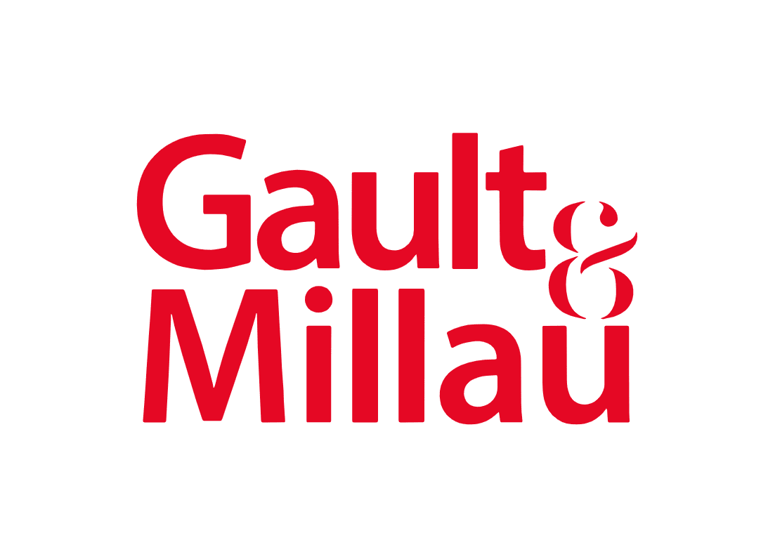

It is a restaurant guide established by two French food critics, which is a rather important institution. Although it may not be the first institution that comes to people’s minds around the world, Gault Millau is also a highly influential and widely respected authority among the public. It’s certainly not as well-known as the story of the Michelin Guide. So, wasn’t Michelin enough? Is it any different? Or are they simply rival institutions? What is its story? How does its evaluation system work? What has been its impact on gastronomy?
Personally, I first came across this institution’s award while researching a restaurant abroad. To me, it somehow felt like a more elite award than Michelin. For a long time, I didn’t really look into what exactly it was. I only knew that it made evaluations like Michelin. Let’s discover step by step the history, purpose, how it rates and gives awards. That way, when we see this award’s sign in front of a restaurant, we can understand what it really means.
What is the history of Gault Millau?
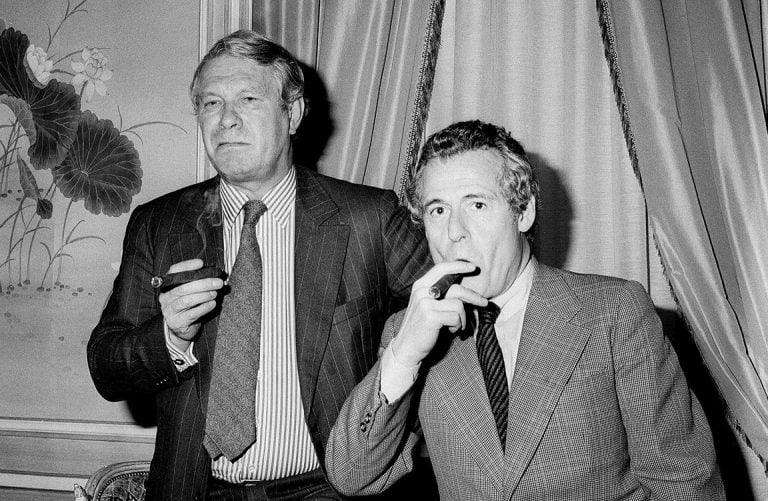

Its name comes from the surnames of Henri Gault and Christian Millau.
Henri Gault was a French food journalist, and Christian Millau was a famous food critic and writer.
In 1962, Henri Gault and Christian Millau began writing about gastronomy together for the first time.
Their aim was to criticize the traditional, heavy structure of French cuisine and to open space for lighter, more creative kitchens.
In 1969, they officially published a guide. You can think of it like the Michelin Guide. However, it was different because Gault Millau was not as strict as Michelin at that time. It supported a freer kitchen philosophy.
They also introduced the Nouvelle Cuisine movement to the world.
To understand the philosophy of Gault Millau, one needs to understand Nouvelle Cuisine. Also, it emerged during a very sensational period.
What is Nouvelle Cuisine?


It emerged in France in the 1970s. It is a movement that emphasizes creativity against the rigid and heavy French cuisine, simple but focused on the quality of the product.
Researchers will see names like Paul Bocuse, Michel Guérard, and Roger Vergé as pioneers.
There are no heavy sauces or long cooking times. We can say the understanding is “less is more.”
It arose as a reaction against the established, heavy, and rich sauce traditional French cuisine.
Britannica defines this movement as an “eclectic style in international cuisine.”
Etymology of Eclectic:
It is borrowed from the French word éclectique, meaning “selective, mixed.” In Ancient Greek, eklegō means “to select, choose,” and the suffix ikos is added to form the adjective.
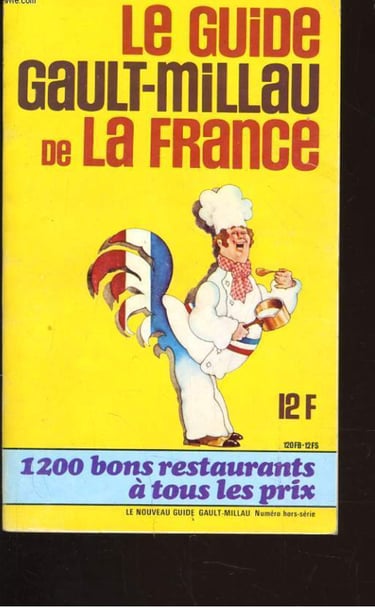

How did the Nouvelle Cuisine revolution happen?
Beforehand, Classical French Cuisine had a structure that was heavy, complex, and strictly adhered to existing recipes with a step-by-step, inflexible procedure. This movement emerged as a revolution against Classical French Cuisine. Nouvelle Cuisine contains lighter sauces and has fewer, simpler cooking steps.
Although simple, its presentation is elegant. It is open to the chef’s interpretation. In other words, it is more flexible. It emphasizes “less but better” plates. For this reason, it caused a burst of creativity. Thus, the foundation of today’s modern cuisine was laid. It also paved the way for molecular gastronomy, which is the full explosion of creativity.
We know that French cuisine with figures like Escoffier was rule-based and systematic. Nouvelle Cuisine emerged and said that we do not comply with this outdated, systematic, and rule-bound kitchen structure.
So, who named it Nouvelle Cuisine?
Henri Gault and Christian Millau first used this name in 1969. These names might not sound familiar to you. Then look at their last names. Gault and Millau. Does it sound familiar? Yes. You have probably seen this institution that ranks restaurants and gives awards, like the Michelin Guide. These two men were the first to use this term. And with them, it rose, became known, and popular.
At the time, one of the pioneers of the movement, Paul Bocuse, was preparing a new menu for Lufthansa when these two writers used the term Nouvelle Cuisine. Afterwards, it became popular. The issue is not just about being simple.
Looking at the period after World War I, this new perspective was quite open to adoption. Healthier, lighter, simpler, and modern. The new generation of chefs liked the creative side, not the old clichés.
Its main features:
Using seasonal ingredients
Using fresh food
Openness to the chef’s touch
Elegant and free from complexity presentation
Opposition to complicated and long menus
What is the meaning of the word?
It is a French word, as can be expected. When I researched its meaning, I found it means "new." So, Nouvelle Cuisine means: New Kitchen.
On Gault Millau’s own website, I found this kind of image. We can say they visualize the revolution this way.
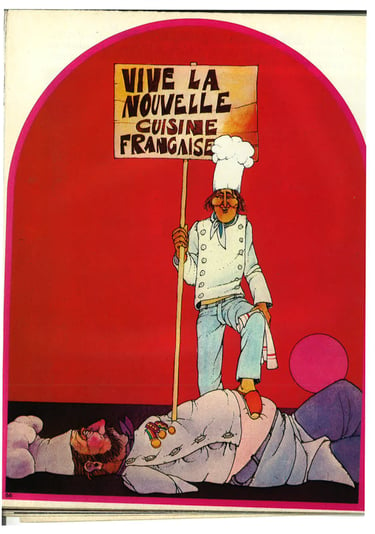

What is the difference between Gault Millau and Michelin?
There are no stars like Michelin.
There is a scoring system. Restaurants receive a score out of 20.
Unlike Michelin, here the chefs are emphasized. If you have read my blog post “What is a Michelin Star,” I explained there that Michelin emphasizes the dish served to us, not the chef. Whether the chef is famous or not, people come and go, but the standard of the starred dishes must be maintained. However, in Gault Millau, the talent in the kitchen is emphasized, not the venue.
When Gault Millau evaluates a restaurant, if it scores below 10 points, it usually is not even listed. However, this information is not on their own website.
On their website, it is defined as follows: They can be rated for food up to 15 points out of 20.
It also says:
“A group of experts evaluates the quality of ingredients, spices, creativity, presentation techniques of the dishes, harmony, and the impressiveness that distinguishes a dish from others. Up to 5 additional points can be earned for service, ambiance, and the overall experience of the restaurant. Since 2010, restaurants are rated with “chef toques,” with a maximum of 5 toques. To enter the Gault&Millau restaurant and gastronomy guide list, a score of 10 points is required.”


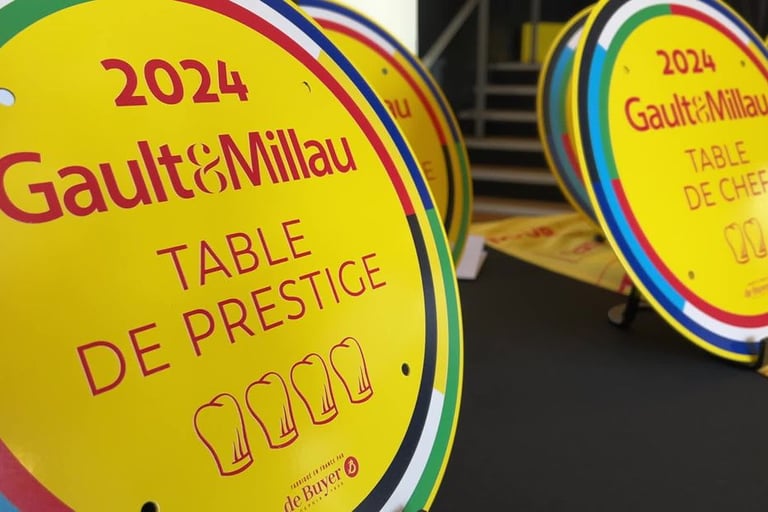

The main differences between Michelin and Gault Millau:
Michelin can actually be called more conservative. It draws more power from the classical rigid French cuisine. As we mentioned, Gault Millau was founded as a counter to this.
Gault Millau’s scoring is more detailed compared to Michelin. While Michelin gives stars, Gault Millau evaluates on points and additionally awards toques if deserved.
Famous Secret Inspectors:
You may have heard of them. Michelin has secret inspectors. The same applies to Gault Millau.
Michelin remains more secretive and closed off. In the industry, experienced, knowledgeable people, gourmets who have traveled and seen the world, secretly act as inspectors for Gault Millau.
People whose identities are not disclosed visit the restaurant. They go as regular customers, eat, and pay the bill.
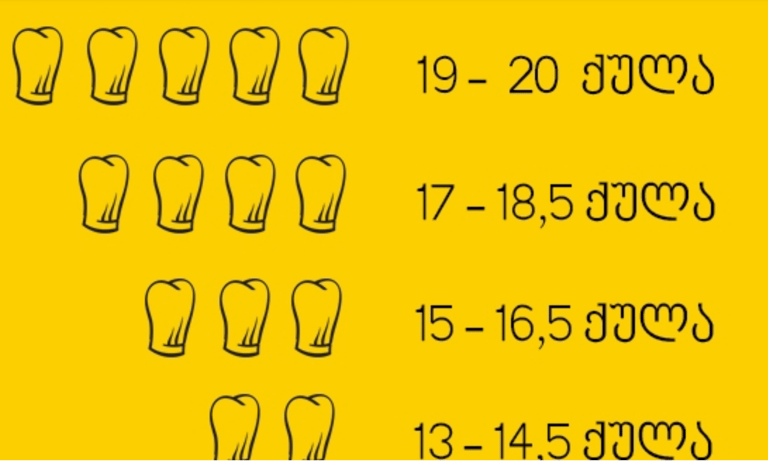

Gault & Millau Scoring System (out of 20)
➤ 10 - 12.5 / 20
Degree: Selected without toque
Description: Good quality, simple and authentic cuisine.
➤ 13 - 13.5 / 20
Degree: 1 Toque
Description: Traditional or modern cuisine mastering basic techniques.
➤ 14 - 14.5 / 20
Degree: 2 Toques
Description: Cuisine prioritizing good ingredients, built on a solid technical foundation, with a new perspective on cooking.
➤ 15 - 16.5 / 20
Degree: 3 Toques
Description: Cuisine offering personalized dishes, prepared with remarkable application, using local and seasonal products as much as possible, with an established artistic expression.
➤ 17 - 18.5 / 20
Degree: 4 Toques
Description: Cuisine centered around extremely high-quality products, standing out with a highly personal signature style, evoking emotions. A rare exceptional restaurant.
➤ 19 - 20 / 20
Degree: 5 Toques
Description: A cuisine of perfection offering a view into the unique universe of an extraordinary chef. One of the best restaurants in the world.


We already mentioned that it focuses on the chef’s skills and scores accordingly.
According to the source The Slovenia (2020), the evaluation is divided into two. In the first part, the average of six elements constitutes 70% of the final score.
These six elements are:
seasoning
the harmony of flavors
technique
quality of ingredients
presentation
and the overall success of the dish
In the second part:
rating of the service
ambiance
the overall experience
These three elements constitute the remaining 30% of the score.
The evaluation of the restaurant continues from the reservation being made, to entering the door, and finally to leaving the door. However, whether the evaluating group includes representatives from France or only selects people from the country being evaluated, or both, is unknown. Honestly, there is not much information. But there are application forms for those who want to become inspectors.
Gault & Millau’s motto is:
“L’avis du gourmet sur le travail du chef”
“The gourmet’s opinion on the chef’s work.”
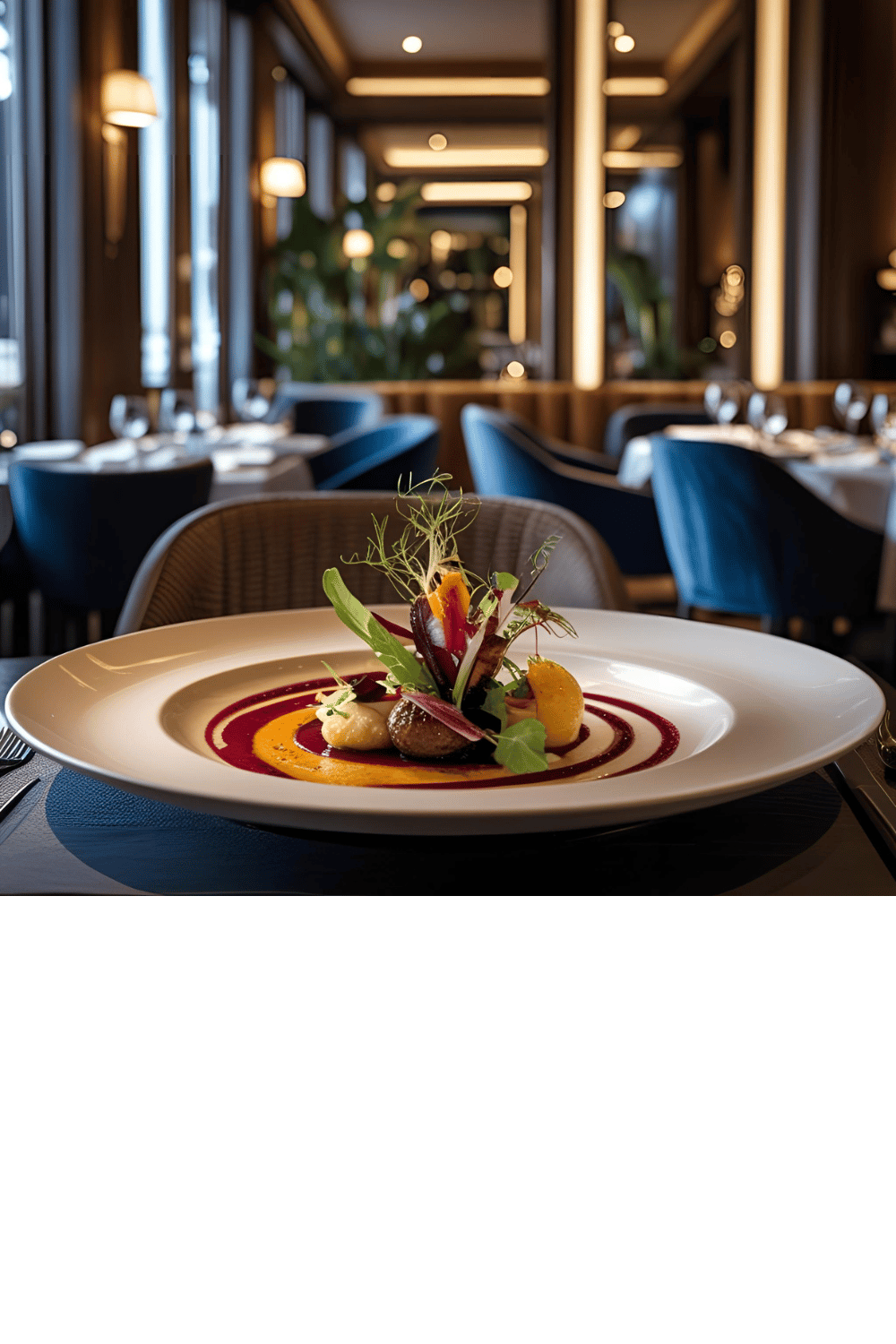

Is there a loss of points?
Yes.
It is updated every year and a new score is given again. The score can increase or decrease.
And the number of toques can also change.
As I mentioned in my Michelin blog post, I think ups and downs are quite normal. After all, it is an area with a lot of human factors. Mistakes are inevitable. Not every dish can come out perfect forever. Moreover, as we mentioned, Gault Millau does not aim for perfection either. However, in the press and media, and also in the industry, a drop in points is often perceived as failure.
Is score everything? Are these institutions the only measure of success?
No. Running a restaurant is unlike anything else. There will be ups and downs. This is normal. Even getting into that scoring system requires serious determination and work. Also, this topic is the same as I explained especially in my Michelin blog post. It can create very serious and abnormal pressure on employees and chefs. We know there are chefs who do not want stars. I did not find such an incident in Gault Millau. However, I found a very interesting and sad news.
A chef named Bernard Daniel Jacques Loiseau received 3 stars from Michelin and 19.5 points from Gault Millau. But in 2003, his score dropped to 17 and he also received very negative criticism from the media. In the same year, he took his own life. It is said that he was depressed. Very sad.
For example, there is a famous series called “The Bear,” you might know it. I was only able to watch the first 3 episodes. Not because it was bad. It triggered me. I had just actively decided to quit kitchen life and then opening and seeing that stress was too realistic for me. I realized I was too affected and really drawn into it, so I couldn’t continue.
This evaluation and news of course do not make these institutions bad. On the contrary, we know they provide serious economic and touristic income. But it is very sad that chefs and kitchen workers put such pressure on themselves that it leads to death. Honestly, I don’t know the solution to this. What do you think about this issue? I’m curious.
So is this a problem limited to just one chef or is it unsustainable to continue a high-rated restaurant?
While researching this, I came across a very good study.
In Jean-François Outreville’s study titled “Sustainability of Top Ranked Restaurants in France” (2012), a striking finding is presented: Do restaurants with high scores from Gault & Millau remain sustainable in the long term? Are these scores a reliable indicator of a restaurant’s success?
Restaurants with high scores listed over 36 years are examined. And the result is:
High-scoring restaurants are not always long-lived.
For example, 32% of the highest-scoring restaurants dropped out of the guide within 24 years.
This shows that Gault & Millau scores are not a guarantee for sustainability.
Some chefs change careers or close their restaurants.
The departure of the chef usually results in the restaurant being dropped from the guide.
There is a statistically measurable relationship between Gault & Millau scores and restaurant lifespan.
But this relationship is complex: High scores sometimes bring risks (such as pressure from expectations).
In conclusion, it does not guarantee economic stability in the long term.
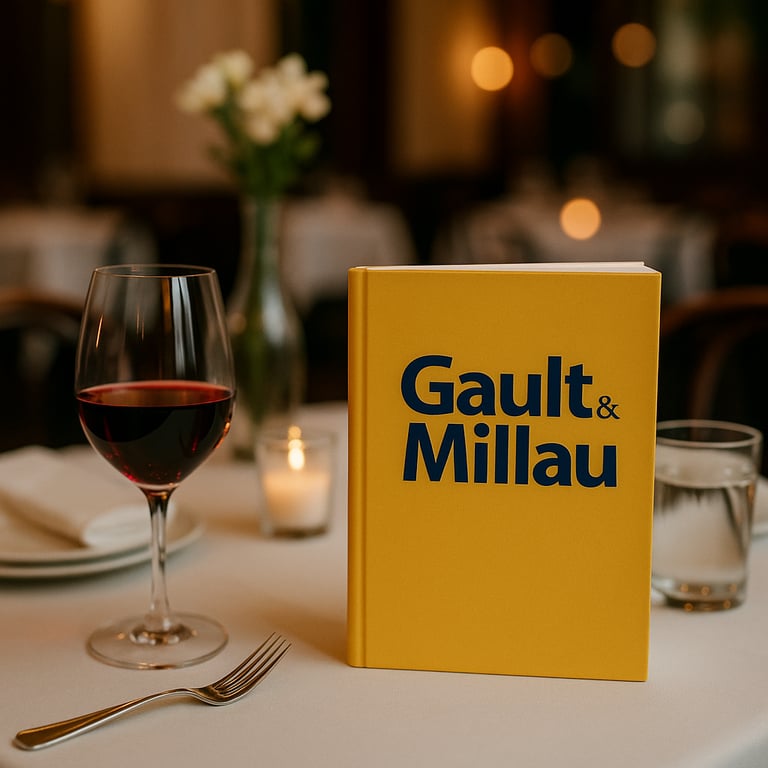

Awards given annually:
Gault Millau does not only give scores. It also gives some awards, and they are quite important.
Chef of the Year
Discovery of the Year
Pastry Chef of the Year
Young Talents
Sustainable Kitchen Award
These awards are very prestigious and important. Imagine a young chef receiving an award from such an important institution or a chef with a limited budget creating a sustainable kitchen with natural products and producing beautiful regional dishes, and winning the sustainable kitchen award. It not only brings income to the restaurant but also attracts tourists to the region. It increases the interest of other young chefs in this restaurant. For a young chef, it also causes an important leap in their career.
At the same time, since it will bring popularity in the press, their income will likely increase. It may enable them to earn money for their future dreams. Maybe it will create job opportunities for other young chefs. It also adds value to the country where they are located.
Fine Dining, you mean?
No.
There are also street foods, bistros, cafes, and everyday dining places in the guide;
POP:
Its meaning is Pour les Petits Prix, that is, affordable places.
It covers areas like bistros, cafes, more budget-friendly places, daily meals, and street foods.Pâtissiers / Pastry Chefs
Sommeliers / Wine Experts
Young Talents
Chef of the Year
Sustainable Kitchen Awards
I think POP is a very logical and interesting category because I think it feels more sincere and flavor-focused.
For the curious, some places that received the POP award in 2025;
Croatia – BioMania:
It is a vegan bistro. It was selected as the Best POP Place of 2025.
Switzerland – ALBA:
It received the “POP of the Year” award in Switzerland.
Slovenia – Dvorni bar & Hiša Polonka:
In Slovenia, two best POP places were selected in 2025.
BEST CHEF AWARDS OF THE LAST 5 YEARS:
2025 Fransa (reel gala’da)Frédéric Anton – Le Pré Catelan, Paris
2025İsviçre (Guide 2025)Marco Campanella – La Brezza (Ascona), 19 pt
2024FransaYoann Conte – La Maison Bleue, Veyrier‑du‑Lac
2024HırvatistanMarko Đurašević – Split
2023FransaOlivier Nasti – La Table d’Olivier Nasti
2023BAE (UAE)Saverio Sbaragli – Al Muntaha
2022FransaHugo Roellinger – Le Coquillage
2022HollandaSyrco Bakker – rehber 2022
2021JaponyaHajime Yoneda – Osaka HAJIME
2021BelçikaChristophe Pauly – Le Coq aux Champs
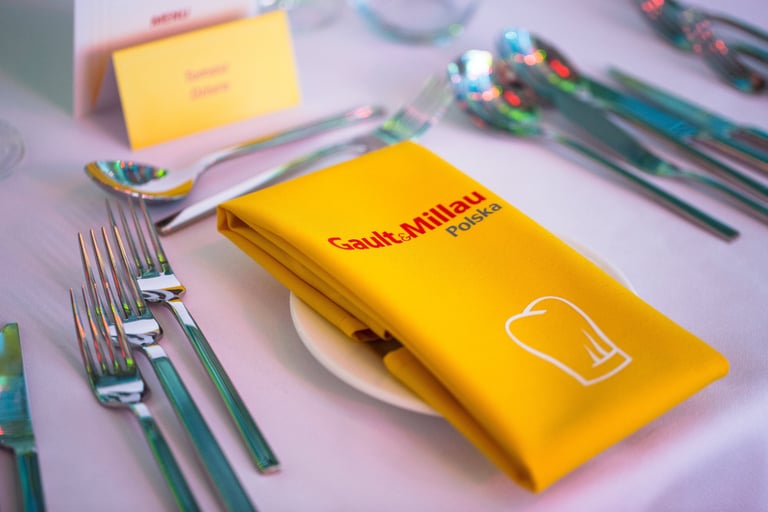

Some of the names announced in 2025 are as follows:


Images from their website:




How does Gault Millau come to a country? Who brings it?
Gault Millau, whose headquarters are in Paris, of course holds the brand rights.
If it wants to enter a country;
It makes a licensing agreement with
a local publisher,
an agency,
an investor partner.
The company is responsible within the country for publishing the guide, training inspectors, rating restaurants, and promoting the guide. For example, in Turkey, they made an agreement with Sözen Group. They manage the organization in Turkey.
How do restaurants enter the system?
There is an important difference from Michelin here:
In Gault & Millau, it is possible for restaurants to “apply.”
But this does not mean that when they apply, inspectors immediately come and evaluate. No, it is just a step to catch their attention, to say “we are here.” Actually, it makes sense, it is also an opportunity for unnoticed, unknown talents to say “notice me.”
In which countries does Gault Millau exist?
France
Germany
Austria
Switzerland
Netherlands
Belgium
Luxembourg
Poland
Slovenia
Croatia
Czech Republic
Slovakia
Serbia
Georgia
United Arab Emirates
Japan
Türkiye


What are the numbers of inspectors?
The highest number of inspectors is in Switzerland with 68 people.
The lowest is in Georgia with 4 people.
However, there are countries that are not disclosed.
Do I want to become an inspector, is it possible?
Yes, it is possible. Just like a normal job application, they open applications on their websites and you submit your application. You can also apply the same way on Michelin’s website. By clicking here, you can see the application information on their own page. Applications are made via email. As far as I understand, in the next steps a case is given and you are asked to solve it. However, since I have never applied, I do not know the process. Probably no one knows because the confidentiality is already high.
Who are these inspectors? Are there any whose identity is revealed?
I think I have checked everywhere I can on the internet. I did not find any record. I also did not see anyone whose identity is revealed. For example, in Michelin there is an interview without directly revealing the identity. They talk about how they entered and the process. However, specifically about Gault Millau, I did not find very detailed information on this topic. They keep it like a secret. No one has leaked it. They are very strict. We do not fully know exactly how the procedure is, where these people are from, what they look at step by step, what they examine 100%. They are not fully open. It is the same in Michelin. They do not say exactly. Not giving openness in such a big project is really amazing.
As a result, since its establishment, Gault Millau has had a very large sphere of influence and its impact continues. Of course, it does not have the worldwide recognition and fame like Michelin. Although it is somewhat behind in popularity, it is a very valuable institution with its contributions and recommendations to gastronomy. Especially when I look for food and drink in a region, I first check TikTok (sorry, I am Gen Z), then Michelin and Gault Millau.
While writing this article, without aiming to praise or criticize, I wrote by researching from scratch. I also did not know the story and effects behind it. I learned while writing. I hope you like it, I hope you enjoy it. Please do not hesitate to share your thoughts and comments. You can always reach me via social media or email. ❤️
Dear Gault Millau, if you ever read my research one day, I hope you like it, you can contact me for any kind of collaboration.
References:
(PDF) sustainability of top ranked restaurants in France: Methodological note and analysis of Gault-Millau from 1974 to 2010. (n.d.-c). https://www.researchgate.net/publication/281782779_Sustainability_of_top_ranked_restaurants_in_France_Methodological_note_and_analysis_of_Gault-Millau_from_1974_to_2010
Wikimedia Foundation. (2025, March 28). Bernard Loiseau. Wikipedia. https://en.wikipedia.org/wiki/Bernard_Loiseau
Night of the culinary oscars - winners of the gault&millau Croatia Trophy 2025 - news. News - Gault&Millau. (n.d.). https://hr.gaultmillau.com/en/news/gault-millau-croatia-2025-winners
How gault&millau rates restaurants - Gault & Millau ... (n.d.-a). https://www.gaultmillauae.com/features/how-gaultmillau-rates-restaurants
Valeur, D. (2020, May 28). Comparison between restaurant ratings and guides. THE Slovenia. https://the-slovenia.com/en/gastronomy/comparison-between-restaurant-ratings-and-guides/
Editor, S. G. (n.d.). Gault & Millau Türkiye 2025 rehberi i̇kinci Edisyonuyla Gastronomi Dünyasının önde Gelen i̇simlerini Ağırladı. Gault & Millau Türkiye. https://www.gaultmillau.com.tr/gault-millau-turkiye-2025-rehberi-ikinci-edisyonuyla-gastronomi-dunyasinin-onde-gelen-isimlerini-agirladi/
American-Express. (2024, June 27). American Express selects: Gaultmillau pop 2025: “Alba.” American Express Switzerland. https://www.americanexpress.ch/en/rewards/selects/gaultmillau-pop-des-jahres-2025-alba-sourdough-pizza
Encyclopædia Britannica, inc. (n.d.). Nouvelle cuisine. Encyclopædia Britannica. https://www.britannica.com/topic/nouvelle-cuisine
Article 10 Commandements. (n.d.-a). https://www.gaultmillau.org/wp-content/uploads/2022/04/10-commandements.pdf
History. Gault & Millau International. (2024, June 18). https://www.gaultmillau.org/history/?lang=en
How gault&millau rates restaurants - Gault & Millau ... (n.d.-b). https://www.gaultmillauae.com/features/how-gaultmillau-rates-restaurants
Tasty Tools
Explore gastronomy.
Concact:
© 2025. All rights reserved.
